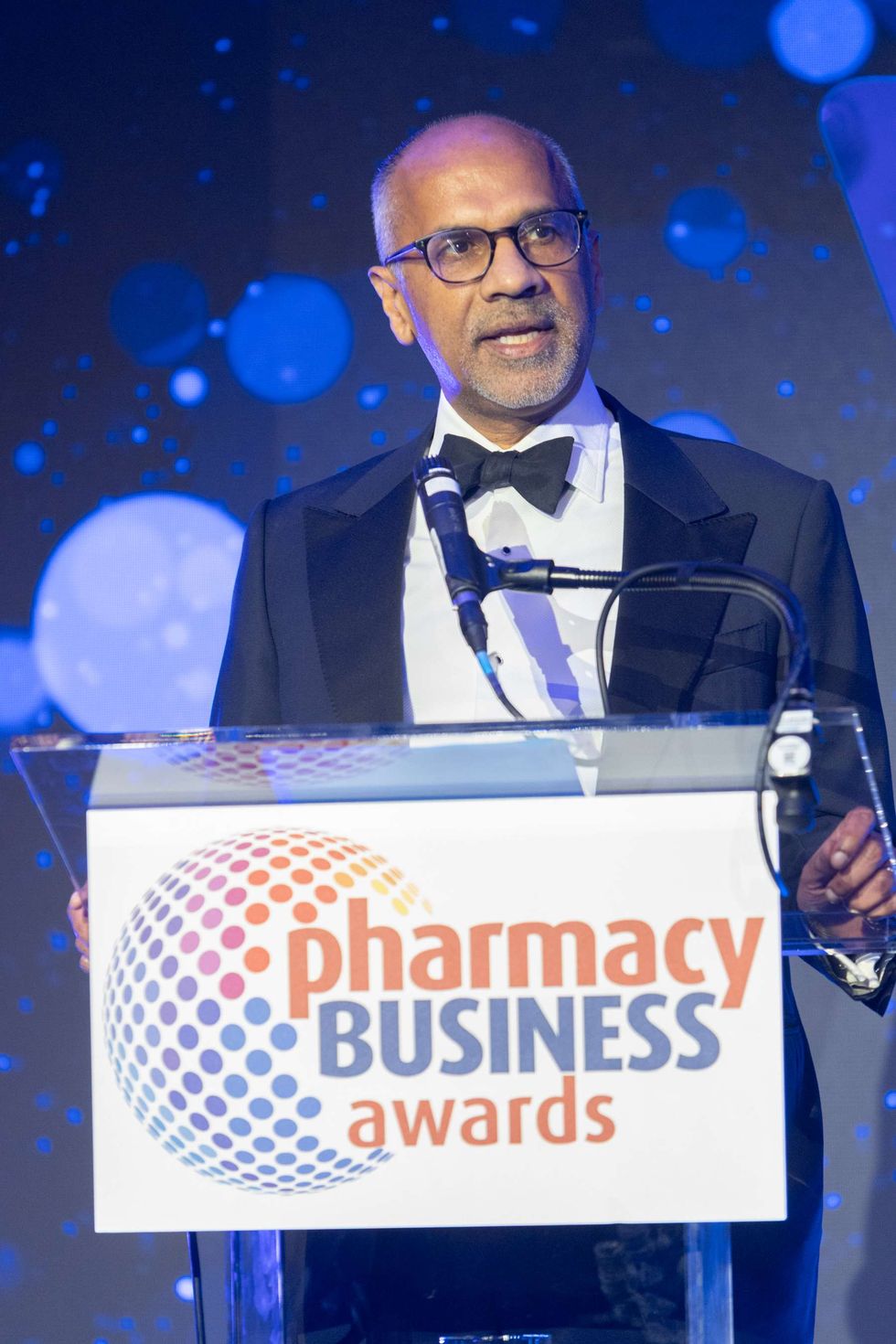LEADING lights from community pharmacy were celebrated for the crucial role they play in public health at the 25th annual Pharmacy Business Awards in London on October 3.
Woking-based May & Thomson Pharmacy took home the coveted Pharmacy Business of the Year Award. Its owner and second-generation pharmacist, Sunil Chandarana, was recognised for building a business that has achieved significant growth by embracing technology and clinical services.
There were 25 awards in total that recognised the best of every facet of community pharmacy – from pharmacy teams and their innovative work – to leading products, wholesalers and manufacturers.
The showpiece awards event of the pharmacy calendar was attended by business leaders from the pharma industry, healthcare executives and leading politicians who were among the 650 guests at the Park Plaza Westminster Bridge.
The chief guest, pharmacy minister Stephen Kinnock, said in his remarks that community pharmacy will be the “cornerstone of neighbourhood healthcare”.
He added, “I want to see community pharmacy playing a key role in the ‘neighbourhood health service’, working collaboratively with other primary care providers to deliver the services patients need in their localities.

“Indeed, 40 per cent of our pharmacies are in the 30 per cent most deprived areas. This shows the reach into communities offered through pharmacies is second to none.”
Hosted by the Asian Media Group (AMG), publishers of Pharmacy Business, and Eastern Eye and Garavi Gujarat news weeklies, the Pharmacy Business Awards have for 25 years championed the innovative work and dedication of community pharmacists.
Shailesh Solanki, the executive editor of Pharmacy Business, told the gathering that in a fractured society, community pharmacy was an example of the strength of diversity.
“For generations, community pharmacists have used their skill, professionalism and compassion in the service of their neighbourhoods and communities,” he said.
“At the heart of that compassion is a profession that is proud of its diversity, and where pharmacists of all colours, creeds and faith, work in harmony for the betterment of the nation’s health.”

Whilst Solanki welcomed the government’s plans for community pharmacy to transition from dispensing medicines to delivering more clinical services – outlined in the NHS 10 year plan – he stressed that the futures of too many pharmacies remained in the balance due to a shortage in funding.
Solanki urged the government to recognise pharmacists as “highly skilled clinicians” whose expertise remains “undervalued and underutilised”. “Whilst the plan has been welcomed as a springboard for the development of community pharmacy, questions remain on the detail of how and when this level of transformation will be delivered,” he said.“
The government’s own economic review into pharmacy shows the sector is underfunded by around £2 billion per year. For the transformation to become a reality, this funding deficit must be addressed quickly, and more clarity needs to be provided on how it will be achieved, so the right investments in people, premises and technology can be made.”
The nominees and winners on the evening showed the skills and expertise community pharmacies can bring to primary care.
Samson Akere, owner of Totty Pharmacy in Greenwich collected the Pharmacy Business Community Award. Akere has a partnership with 20 PureGyms around London , where he delivers structured campaigns during Men’s Health Week, International Women’s Day, and Black History Month. He also mentors the next generation by hosting students from secondary schools, colleges and universities.
The Patient Care in Pharmacy Award went to Olive Yamdjeu from Fairoak Pharmacy in Streatham for her efforts in rebuilding an ‘imperfect relationship’ with the local GP surgery that eventually led to a complete renewal of cooperation and trust, to benefit patients.
Babatunde Akomolafe of Christchurch Pharmacy in Braintree was recognised for his ‘PIES’ mantra: productivity, innovation, efficiency and security, as he took home the Pharmacy Technology Award.
The Pharmacy Team of the Year went to Cadbury Heath Pharmacy in Bristol who were lauded for being passionate about patient care and their diverse skill mix which has set the pharmacy apart in the local community. The team has embraced the NHS’s enhanced and advanced services and delivers them with private services in an efficient and sustainable manner.

Amerjit Singh, owner of Skills4Pharmacy, took home the Pharmacy Business Development Award for his work with over 200 community pharmacies and small chains across the country every year, allowing them to recruit new staff and having a beneficial impact on patients.
The Pharmacy Assistant of the Year Award went to Ayman El Melali from Mitcham Pharmacy. El Melali was recognised for his patience and calmness, inspiring confidence in colleagues and patients alike, while his attention to detail prevents errors, reduces hospital admissions, and spreads peace of mind.
Rahaf Kanj of Asda Pharmacy, Park Royal, was awarded the Pharmacy Business Public Health Pharmacist of the year for her work in supporting the health needs of a diverse community.
Judges said Kanj had become one of the most effective public health champions in the Asda estate with an approach anchored in empathy, driven by data, and powered by determination to eliminate health inequalities.
The Pharmacy Business Inspiring Woman of the Year Award went to Sukhi Basra of Clinichem Pharmacy in Pimlico. Basra is a trailblazing pharmacist who founded the pioneering health hub – The London PharmaClinic.
Beyond her clinical achievements, she also inspires the next generation – mentoring women, breaking cultural silences, and proving that leadership grounded in empathy can change lives and shape the future of pharmacy.
The Ram Solanki Editor’s Award, named in honour of the founder and legendary editor-in-chief of Asian Media Group and Pharmacy Business, Ramniklal Solanki CBE, was collected by Peter Cattee, CEO, Peak Pharmacy, for his 40 years of service and advocacy for the community pharmacy sector.













